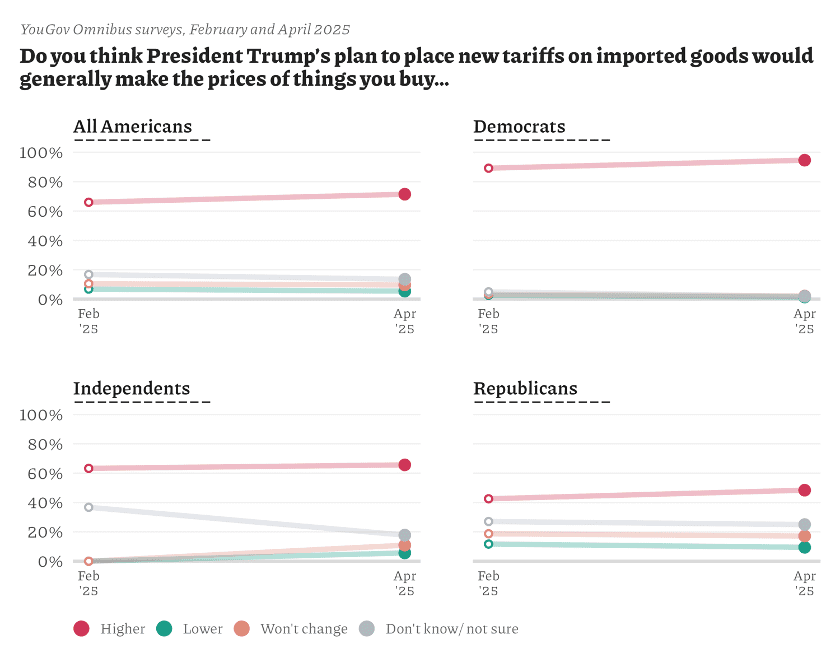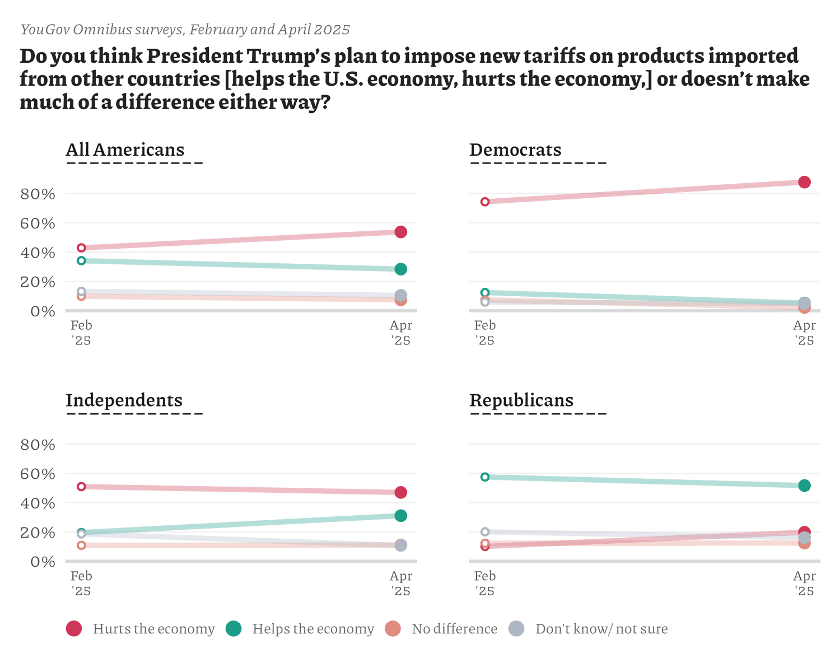Americans Widely Believe Tariffs Will Drive Up Costs
In This Resource
As President Trump continues to announce, amend, and negotiate new tariffs on other countries, polling from States United shows that most Americans believe they will drive up costs and, in turn, hurt the economy.
The tariffs, which are a tax on imported goods, have targeted countries around the world. Stock markets have plunged, and consumer prices are projected to continue rising in response.
A dozen state attorneys general sued the Trump administration for exceeding emergency powers and skirting congressional authority.
More than seven-in-ten Americans surveyed said they think Trump’s new tariffs will drive up the price of goods. The survey also showed that more than half of Americans believe tariffs will hurt the U.S. economy.
While there is broad agreement among Democrats and independents on these two questions, 48% of Republicans also believe costs will rise. However, few Republicans believe they will hurt the economy.
States United partnered with YouGov on a national survey of 1,001 adults between April 10 and 11, 2025.
- Of those polled, 95% of Democrats and 85% of independents think new tariffs will make the prices go higher for the things they buy. Just under half of Republicans agree. Only a tenth of Republicans polled believe the tariffs will lower costs.
- Most Americans also believe these tariffs will hurt the economy. Though Democrats and independents widely agree on this question, just 16% of Republicans polled say the economy will suffer.
States United asked Americans how they thought tariffs might affect the economy in February and again in April of 2025. Most Americans believe that placing new tariffs on imported goods would increase the prices of things they buy. The share of Americans who believe this increased from 68% in February to about 72% in April. Few Americans—around 5%— say tariffs will decrease the price of goods.
The share of both Democrats and Republicans who believe that tariffs will increase the price of goods has also increased. About 88% of Democrats said tariffs would drive prices up in February, while nearly 95% said the same in April. The share of Republicans who believe tariffs will increase prices increased from 46% to about 48% over this period. Opinion among independents remained stable at around 65% who believe that tariffs increase prices.

States United also asked Americans if they think President Trump’s plan to impose new tariffs helps the economy, hurts the economy, or makes no difference. More Americans believe that tariffs will hurt the economy in April (54%) than did in February (43%). The share of Democrats who said that tariffs hurt the economy increased from 76% to nearly 89%. While substantially fewer Republicans believe the same, it is noteworthy that the percentage of Republicans who said that tariffs hurt the economy grew over this time frame, increasing from 12% to about 16%. The share of independents who said that tariffs hurt the economy also increased from 58% to 66%.

The States United Democracy Center partnered with YouGov to conduct the two surveys shown here, which were fielded in February and April 2025 to gauge Americans’ attitudes. Both surveys interviewed about 1,000 registered voters. Responses were additionally weighted to match population characteristics with respect to gender, age, race/ethnicity, education of registered voters, and U.S. Census region based on voter registration lists, the U.S. Census American Community Survey, and the U.S. Census Current Population Survey, as well as 2024 presidential vote. The margin of error for these surveys is approximately ± 3.5 percentage points, though it is larger for the analysis of partisan subgroups described above. Therefore, sample estimates should differ from their expected value by less than the margin of error in 95% of all samples. This figure does not reflect non-sampling errors, including potential selection bias in panel participation or measurement error.
In keeping with best research practices, we classify independent voters who reported “leaning” toward either the Democratic or Republican parties as partisans. Therefore, we define “independents” as those respondents who professed no partisan attachments whatsoever.